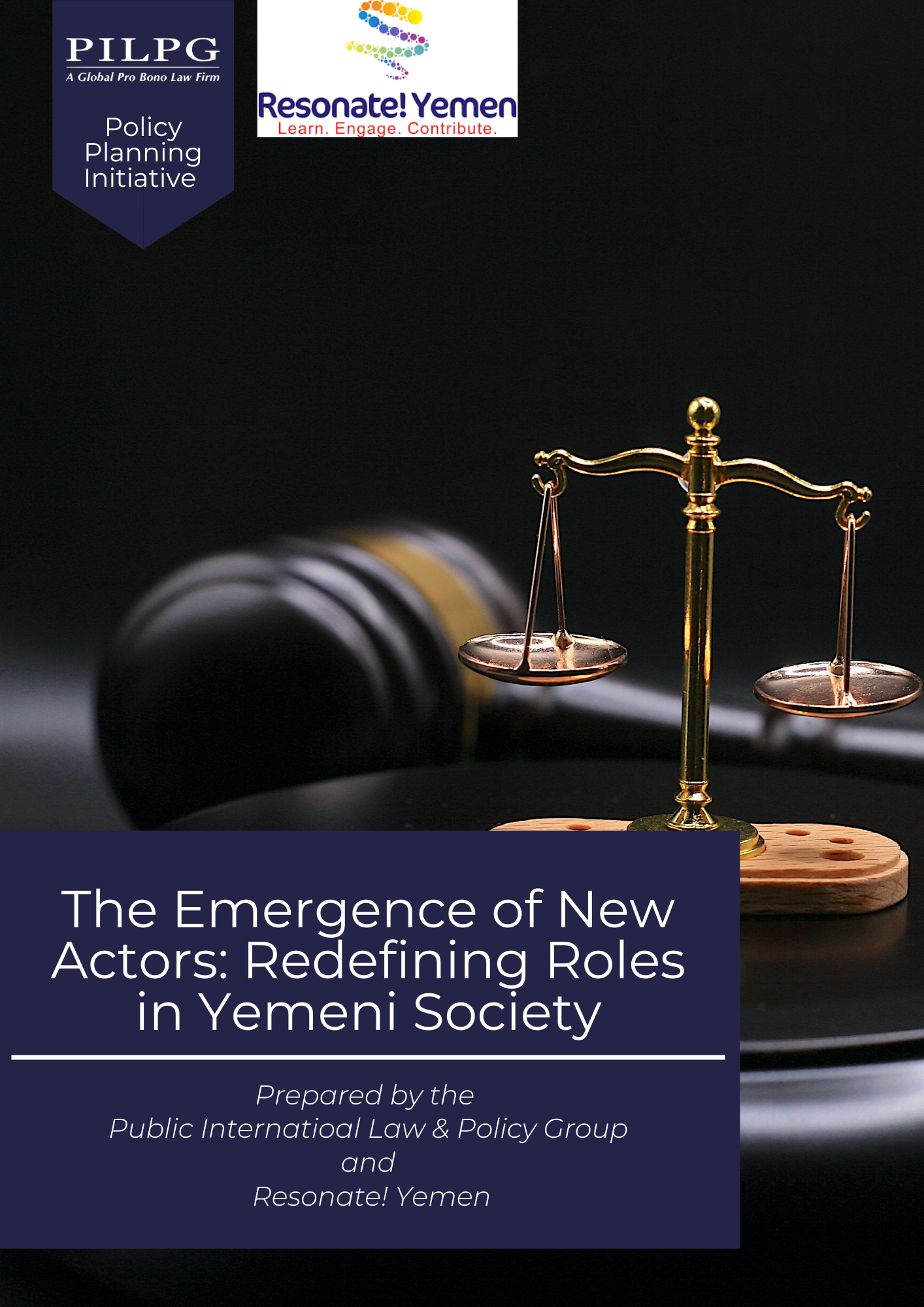Policy Planning White Paper:
The Emergence of New Actors: Redefining Roles in Yemeni Society
Statement of Purpose
Yemen is a state with fragmented power structures and various political actors seeking influence and control over different segments of Yemeni society. One way to exert such influence is by governing and presiding over different aspects of local dispute resolution, a common form of conflict mediation in Yemen. This White Paper provides an analysis of public opinion of those in both ROYG and Ansar Allah controlled territories on some of the newest actors to exert their control over these processes, particularly the Mushrifeen in the North and other non-state armed groups, including the Resistance Forces and the Security Belt Forces (SBF), in the South, and how they have impacted Yemen's justice systems.
Executive Summary
Years of conflict have significantly disrupted power structures within Yemeni society, amplifying trends established after the 2011 Arab Spring transition. In Yemen, governance increasingly relies on individual commitments and on agreements between social, political and security actors. The impact on Yemeni citizens is particularly clear when examining a key aspect of governance – the resolution of local disputes. This position paper shows how two newly influential groups in Yemeni society have amplified their power by controlling aspects of dispute resolution. In the North, the Houthi mushrifeen, or appointed supervisors, have effectively taken over both the informal and formal dispute resolution process. In the South, non-state armed groups funded by external actors, including the Resistance Forces and the Security Belt Forces (SBF), are in some areas responsible for delivering judgments as well as implementing decisions by force.
Relying on interviews conducted with Yemenis in 2021, including in governorates held by Ansar Allah, this paper provides a snapshot of how dispute resolution functions (or fails to function) in parts of North and South Yemen. Yemen’s justice system includes a rich tradition of non-state dispute resolution, but the role of these “new actors” in dispute resolution demonstrates four important insights:
Where the judiciary and formal legal mechanisms for resolving disputes exist, interviewees lack confidence in them.
Local dispute resolution mechanisms may exist in theory but not in practice, resulting in the de facto prominence of “new actors” in dispute resolution.
There is high variability in the non-state dispute resolution mechanisms communities employ, including within the same districts. Parties to a dispute can in theory choose from a range of tribal and non-tribal dispute resolution processes, but local conditions may impose one of the “new actors” as the only effective arbitrator.
“New actors” lack accountability, and are likely to be biased by ideological fervor or material incentives.
Recommendations for policymakers include:
Monitor local dispute resolution practices within areas where the justice system has disintegrated, including Aden and parts of Taiz and Shabwa, to understand the full range of community approaches.
Explore methods for promoting and protecting the integrity of dispute resolution from the involvement of security actors and political operatives.
Conduct further research on options to strengthen local ownership of lower-level dispute resolution to promote stability in communities.
About PILPG’s Policy Planning Initiative
PILPG’s Policy Planning Initiative supports the development of long term, strategic policy planning that is crucial to international accountability, global conflict resolution, and the establishment of international peace. The Initiative provides timely and accurate policy planning analysis and work product on pressing and future policy conundrums by leveraging PILPG’s deep network of talent within the international legal and policy communities and experience with its pro bono clients globally. PILPG Policy Planning focuses on advising policymakers, policy shapers, and engaged stakeholders on pressing issues within the arenas of international law, war crimes prosecution, and conflict resolution efforts. This includes identifying and addressing gaps within existing policies, anticipating key conundrums and questions that will riddle future policy decisions, applying lessons learned from comparative state practice, and proactively producing and sharing work product to inform such policies and avoid crisis decision making.
About PILPG
The Public International Law & Policy Group is a global pro bono law firm providing free legal assistance to parties involved in peace negotiations, drafting post-conflict constitutions, and war crimes prosecution/transitional justice. To facilitate the utilization of this legal assistance, PILPG also provides policy planning assistance and training on matters related to conflict resolution.
Since its founding in 1995, PILPG has provided legal assistance to over two dozen peace negotiations, and over two dozen post-conflict constitutions, and has assisted every international and hybrid criminal tribunal, as well as helped to create a number of domestic transitional justice mechanisms. PILPG represents a diverse array of pro bono clients including states, sub-state actors, opposition groups, self-determination movements, civil society, and marginalized actors, including women and youth.


